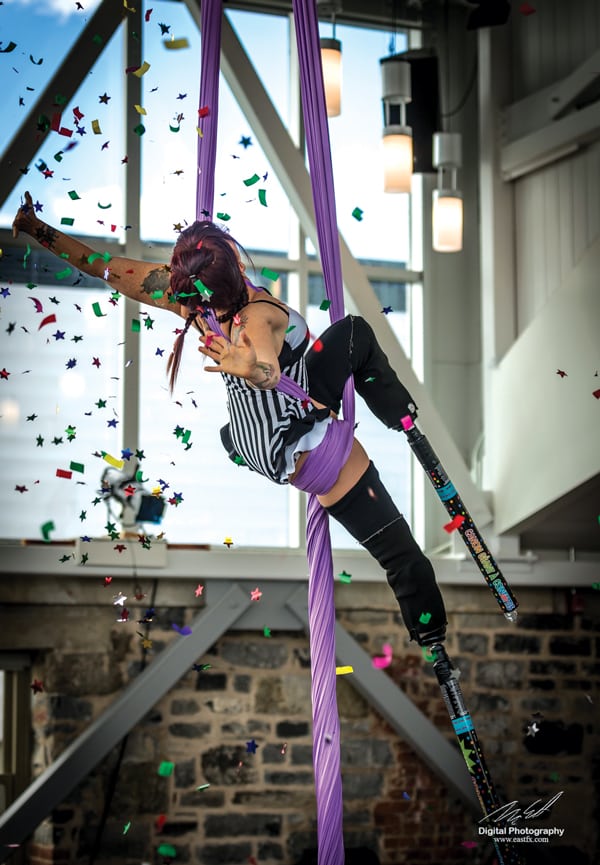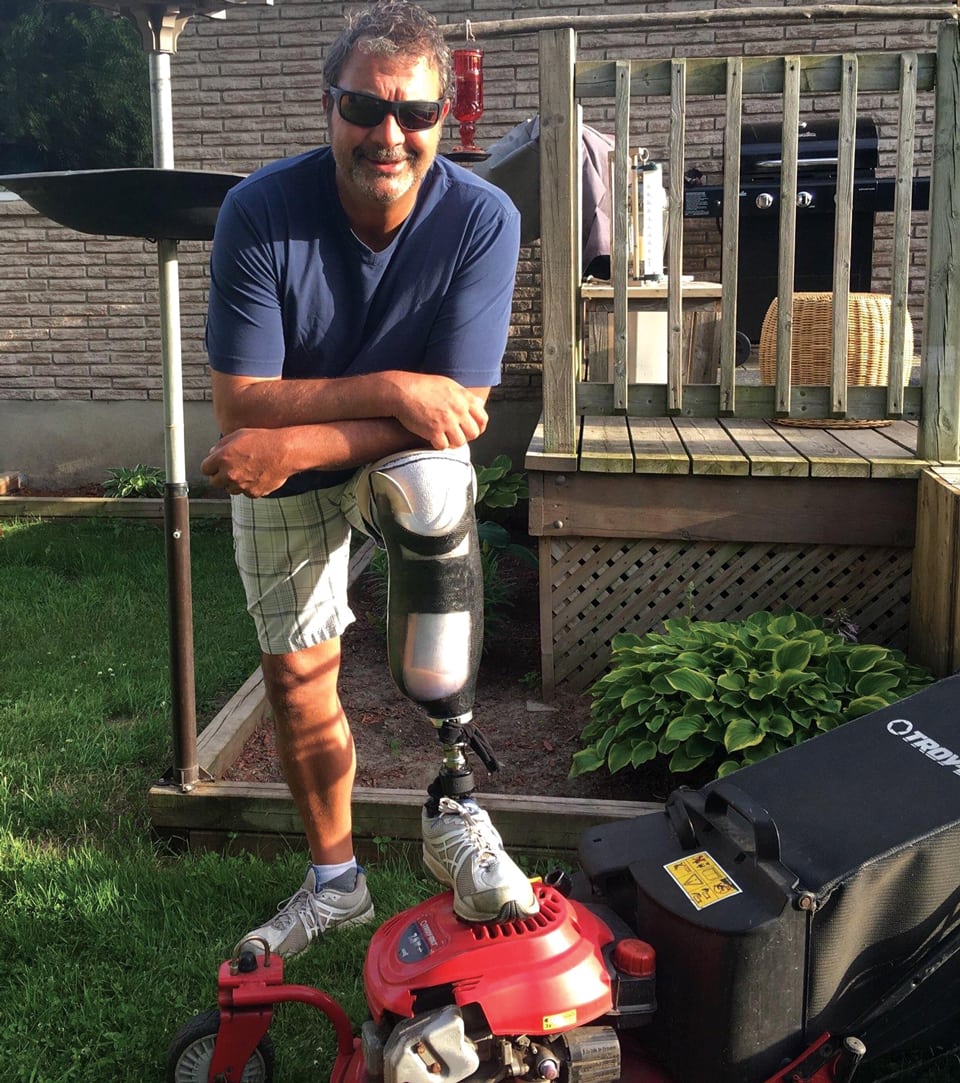Words Elizabeth Bokfi
“How are you doing these days, with that little peg leg of yours?” said an acquaintance of mine with whom I had worked on a very important community project years ago—an older gentleman, a professional, and someone that I, in that instant, lost all respect for. “How’s that [insert male anatomical word here]-enlargement surgery of yours working these days?” is what I felt like responding. He thought he was being funny; me—not so much.

We had bumped into each other along a busy sidewalk and he was in the company of several friends I did not know. His attempt at humor crossed some serious lines—lines in my head, boundaries I had set that he had no knowledge of. Humor can ease discomfort, or it can create it. I’m not standing on a peg, for starters. Managing to insult me and at the same time give away my anonymity in four seconds flat, he had stepped, unwittingly, onto a disability landmine, his own limbs still intact.
Having navigated 11 years of amputee lifestyle, there’s one thing I’ve learned for sure: There exists a disability culture, and with it comes a myriad of self-invented emotional and physical hierarchies, boundaries, and rules and regulations that amputees use to govern, and are governed by. Weird? Maybe, but how else can we attempt to control the uncontrollable? I culturalize everyone I meet. It’s okay if I make amp jokes, but for non-amputees to do so—not okay.
There may be a link between humor and the ability to process emotional trauma. Could this be why some people laugh at funerals? It might well be that laughter is sometimes a defense mechanism. If a defense mechanism is “an unconscious psychological mechanism that reduces anxiety from unacceptableor potentially harmful stimuli” (as stated in Psychology Second Edition, by Daniel L. Schacter), I can’t help but wonder how is it that my amputated leg causes the jokester anxiety? Why does he laugh at me, making me the brunt of his joke, using me as his defense mechanism? Is my sawed-off leg viewed as unacceptable, potentially harmful, stimuli?
There are various reasons why non-amputees and amputees make jokes. Self-humor helped Erin Ball of Kingston, Ontario, accept her amputations. After losing both feet in 2014 to frostbite, the circus artist, coach, and owner of Kingston Circus Arts (www.kingstoncircusarts.com) at first wondered how she would ever be able to go on doing what she loves, without feet. Ball now incorporates humor into her artful performance routines.
“After my accident, circus gave me a reason to go on. It gave and continues to give me independence, goals, strength, community, purpose, a creative outlet, a way to connect with others, and so much more,” says Ball.
Initially following her accident, Ball felt ashamed of her legs, covering them in an effort to blend in. “I came to a turning point in the middle of a performance in the summer of 2015,” she says. “I was wearing three pairs of legwarmers to try to cover my thin, metal-pole-ankles and my dad encouraged me to take them off. I eventually did, with a lot of hesitation, and I never put them back on. Everything changed for me after that. I started to find humor in my situation [and] explored various leg attachments, and I became a bit obsessed…. I began posting photos [on social media] of my legs, without prostheses, putting googly eyes on them, drawing faces on them, and so much more. I could laugh about what had happened.
“For me, humor was my acceptance,” Ball continues. “I know it’s not everyone’s experience, and I respect that, but I truly can’t imagine my life today without leg jokes. I’ve taken it quite far and have developed an affinity for fake blood and recreating old horror movie scenes. Last year for Halloween I was a foot-eating zombie. It’s like a floodgate of creative ideas has opened up. Sometimes I use these ideas for shows, and sometimes I just use them for personal photos, etc.”
As much as Ball has embraced her own brand of amputee-flavored humor, there are boundaries she too feels shouldn’t be crossed by the able-bodied. “I hesitate about humor created about amputees that is not by amputees,” says Ball. “It feels a bit insulting and inappropriate to me. [Humor] helped me heal, and it helped me share my situation with others. I don’t really see a reason for others outside of our situation to be using humor directed at us.”
For others, humor is just humor, and humor equals healing, regardless of how it arrives. For John Dunkley of Limoges, Ontario, still new to amputee life, puns and witty comebacks are his thing. Dunkley lost his left foot in February due to cancer, but not before several surgeries to remove tumors on his ankle. After his medical team suggested flap surgery, Dunkley made an informed decision to have a below-knee amputation instead. Perhaps having had control over the decision has made it easier to accept, and therefore his perspective on amputee humor is different than others’ may be.
“Yes, I’ve experienced hearing comments and jokes,” says Dunkley. “As a younger person I would have most certainly participated. Never to anyone’s face. I can’t say I’ve had any negative experiences, but, to be perfectly honest, I don’t pay heed to anything said to me or about me. I’ve never been one to worry about what people think.”
Amputees have different opinion s about what is offensive and what is not. Some poke fun at their own disability; others are offended when someone else makes fun of limb loss.
s about what is offensive and what is not. Some poke fun at their own disability; others are offended when someone else makes fun of limb loss.
“I want to start off on the right foot here,” Dunkley puns. “I can’t see myself being offended by anyone—not family, friend, or foe. Kids are the funniest. They lack a filter…[but] I did have one woman ask me if anyone ever asks me what happened. I responded with, ‘No, just you so far.’ I thought it was a clever way [for her] to find out the lowdown.”
Across the pond, in London, England, stand-up comedian Colin Leggo (yep, that’s his real name—I asked) incorporates amputee humor into his stage routine. Leggo began a career in comedy in 1999 while still in university. “Like most acts, my routines have changed as I’ve gotten older. It just so happens that me getting older also involved losing a limb; naturally, this became part of the routines.”
After losing his right leg below the knee to Type 1 diabetes in 2014, Leggo began a vlog series, The Leg Blogs, for his YouTube channel www.youtube.com/user/ColinLeggo/videos), video-documenting his amputation journey straight from the hospital. Some funny and relatable stuff in there, Mr. Leggo. “After my operation, I used comedy as a distraction
from the pain, the other patients on the hospital ward, and the monotony of hospital life,” says Leggo. Produced and edited through his phone, the series received positive attention.
Leggo has his own rule when it comes to amputee humor. “For me,” Leggo explains, “the general rule is, ‘Jokes can be made about anyone or anything, as long as there’s a point to the material that isn’t just making fun of something that the recipient can’t do anything about.’ From my own personal experience working with other disabled comedians, there’s a huge amount of people out there that welcome jokes about their disabilities—as long as it’s not just poking fun at someone’s appearance or the way they speak, [lacking a] real punchline.”
Leggo feels that “trying to find the funny” in his situation has become therapeutic. “It would be so easy to sit at home and wallow about the things that you can’t do or find hard with only one leg, but by trying to make those situations into routines, it lifts your mood and makes you think, ‘Life isn’t bad after all.’”
His best humorous comeback to “You’re not disabled enough!” at a handicap parking spot?
“After hearing the ‘You’re not disabled’ line one too many times, I made a CD with some sad piano music on it to have in my car at all times,” Leggo explains. “One day, as I was walking back to my car, a man said, ‘Should you be parked there?’ I said nothing, opened my car door, put the sad piano music on, sat on the car park floor, took off my leg, and then, whilst pretending to weep uncontrollably, dragged myself, one-legged, into the car.”’nough said.
— WORDS Elizabeth Bokfi

[/cmsmasters_text][/cmsmasters_column][/cmsmasters_row]



